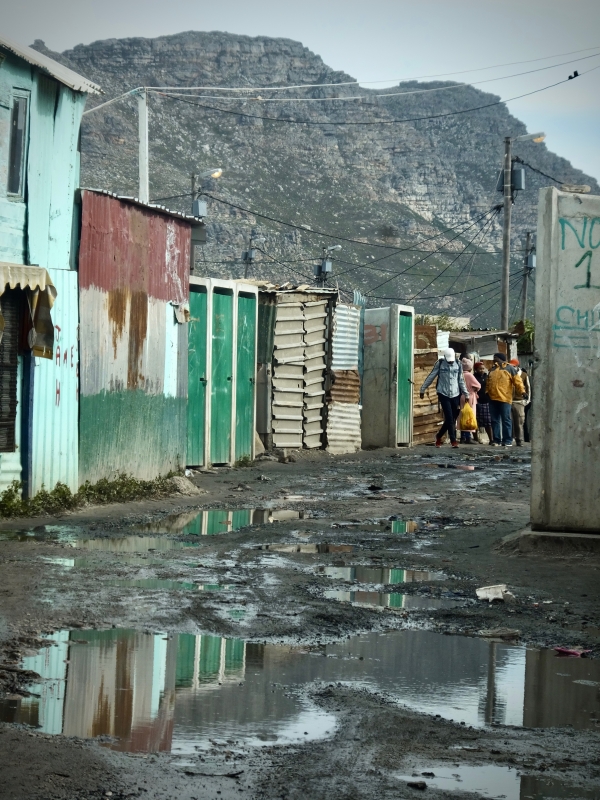Community action in the time of COVID-19: Moving at the speed of trust; sitting with complexity
A significant proportion of South Africans believe that the COVID-19 pandemic will make people more supportive of one another. This finding of a survey conducted by the HSRC and University of Johannesburg is borne out by stories of human agency unfolding in Cape Town community responses to COVID-19. Together with other self-driving volunteer groups, these illustrate the centrality of human relationships, solidarity and trust in effective crisis responses. The challenge will be for the government to work with these social initiatives going forward. By Diana Sanchez Betancourt and Andrea Teagle.
Historically, pandemics have forced humans to break with the past and imagine their world anew. This one is no different. It is a portal, a gateway between one world and the next.
– Arundhati Roy
Silhouetted against an open doorway of the dimly lit community kitchen, a young and an older woman each take one end of a large stainless-steel pot and carry it outside, placing it beside two other pots on a crate. The young woman, Nolubabalo Bulana, lifts the lid and the smell of chicken rises into the cool winter air, greeting a handful of Vrygrond residents waiting in a line. The kitchen is one of 16 that Vrygrond United 4 Change, a community-based organisation, set up through their COVID-19 response team during lockdown, in collaboration with the Muizenberg Community Action Network (CAN) of an adjacent middle-class suburb.
“We thought, OK, the government has announced this [lockdown]. How are we going to survive?” recalls Bulana, who is the co-founder and secretary of the movement. Having grown up in Vrygrond informal settlement, Bulana is familiar with the challenges that residents face, including the 80% unemployment rate.
Recognising the need for a community response to provide food parcels to the most vulnerable, Bulana and two friends, young Vrygrond activist Asanda Ndudula and Theresa Wigley from Muizenberg, called on community leaders to help them identify those most in need. “We expected about 100 people,” Bulana said, “but it was basically everyone in the community. So, we went back to the drawing board.”
Localised responses
According to the COVID-19 Democracy Survey, conducted by the University of Johannesburg and the HSRC, 35% of adults in South Africa went to bed hungry during lockdown. While startling, this percentage is rising off a high base. In 2017, 21% of households had inadequate or severely inadequate food access, according to Statistics South Africa. In a country where wealth disparities are gaping and normalised, the shared national experience of the pandemic illuminated these realities anew, catalysing unprecedented civil society responses.
Says Brendon Bosworth, who manages communication for Vrygrond’s sister COVID-19 response movement, the Muizenberg CAN: “The coronavirus [pandemic] has really created a large potential for pulling apart, so you see people divided on politics, on what they think about lockdown regulations, whether they follow them … Within this context of polarisation, being part of something like [the CAN] is the corollary. It’s an opportunity to build, to be part of building and creating something together.”
The Muizenberg CAN is one of over 150 such self-organised community responses under the Cape Town Together (CTT) umbrella. CTT, which grew from a small, diverse group of volunteers networking via social media, now has 14 600 followers on their Facebook page.
As Leanne Brady, a pioneer of the CTT and the Salt River CAN, explains: “It was just people who recognised complexity and that it’s not all about epidemiological models but social sciences at the core, you know, recognising that what we need isn’t a technical solution. What we need is a human solution.”
Sprouting from the ground up, each response team has designed their own working model. In Vrygrond, Bulana and her team realised that food parcels would not work - community meals would be more cost-effective and reach more people. The group mapped out the community to decide where the new community kitchens would best be placed. Run entirely by Vrygrond volunteers, the kitchens have raised funds from individuals, organisations and local and international NGOs.
In Mfuleni, community volunteers from the Mfuleni CAN and its sister movement, the Observatory CAN, found that providing Shoprite vouchers to families was an effective way to minimise conflict over resources and allow people to make their own purchasing decisions. In Observatory, a more expansive and inclusive sense of togetherness has grown up around a CAN community pasta kitchen.
As Brady notes: “[The CTT] starting point is that local communities are best placed to know what they need. We move at the speed of trust and allow ourselves to sit with complexity, even if it means sometimes slowing down.”
Bridging communities
The organic pairings of some of the CANs acknowledge the uneven privilege built into South Africa’s urban landscape, and seek to build solidarity and share resources, including information, data, face masks, food and gardening support. Partnerships are built by and for both areas, tapping into local agency and illustrating the potential of collaborations across racial, income and spatial gaps. Some, like the Vrygrond 4 Change-Muizenberg CAN partnership, reflect geographic proximity. Others, such as the Mfuleni-Observatory partnership, came about because of existing relationships between individuals from the two areas.
Observatory CAN volunteer Grace Coates explains that her collaborative work with Mfuleni, which has seen vouchers distributed to more than 480 people to date, happened entirely remotely, despite data and internet connectivity challenges.
Reflecting on the Vrygrond-Muizenberg partnership, Bosworth says, “There’s been a really nice bridging between these communities that are right next door to each other in ways that are quite particular to this moment.”
Addressing structural inequalities
What is the future of these groups after the pandemic and the accompanying sense of urgency have passed? “Building two CANs side by side … and trying to take it away from the charity space to more of an empowering kind of space makes it more long term, I think,” Coates says.
Siphokazi Mnyamana, a volunteer at the Mfuleni CAN, says “What Covid-19 has shown me is there is a little bit of Ubuntu towards people. We can combine and do something better with our country.
Because we have forged relationships. We are talking to people we never even saw. But we are talking to people - like amaGrace [Coates] - like one of our family. It’s like now we know them.” Mnyamana says that the plan is to register the Mfuleni CAN as an NGO and use it as an umbrella organisation to unite developmental work in the area.
Vrygrond United 4 Change has secured 15 entrepreneurial scholarships from the False Bay Business School for unemployed youths. Bulana also has plans to assist youngsters to go into social work, in recognition of a dire need for psychosocial support in the area.
CTT members have also begun food-growing initiatives, while the Observatory CAN has stepped in to contest the removal of a group of homeless people from St Peter’s Square. Such moves recognise and attempt to address long-term structural issues beyond the immediate food and income shortages associated with the pandemic.
Government responses alone will never be enough to address large societal challenges. These stories illustrate the potential for localised, non-hierarchal initiatives built on relationships to begin to bridge our deep geographical and social divides. Whether the government can relate to these efforts, particularly at localised level - and how - remains to be seen.
Finding ways to nurture government-citizen relationships and collaborative governance will be critical to maintaining the momentum of these positive responses to COVID-19, and for imagining and forging our urban world anew, as Arundhati Roy invites us to.
Authors: Andrea Teagle, a science writer in the HSRC’s Impact Centre, and Diana Sanchez Betancourt, a senior researcher in the HSRC’s Developmental, Capable and Ethical State division
ateagle@hsrc.ac.za
dsanchez@hsrc.ac.za
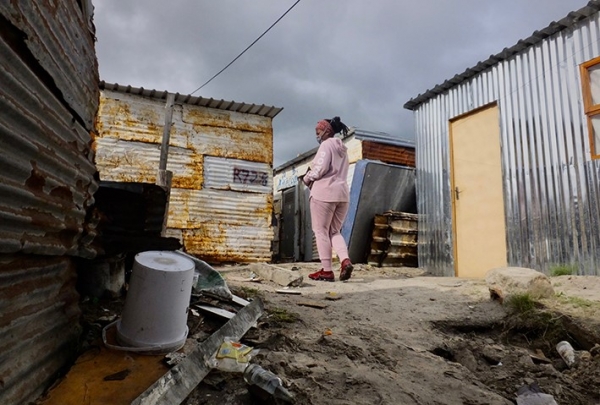
Atashi Tose (29), a volunteer at Vrygrond United 4 Change, makes her way from a community kitchen to the serving table in a street nearby. On today's menu is spinach, butternut and rice. The volunteers are deliberate in their use of language: the community kitchens are not soup kitchens - they are dignified spaces providing nutritional and varied meals.
Photo: Andrea Teagle
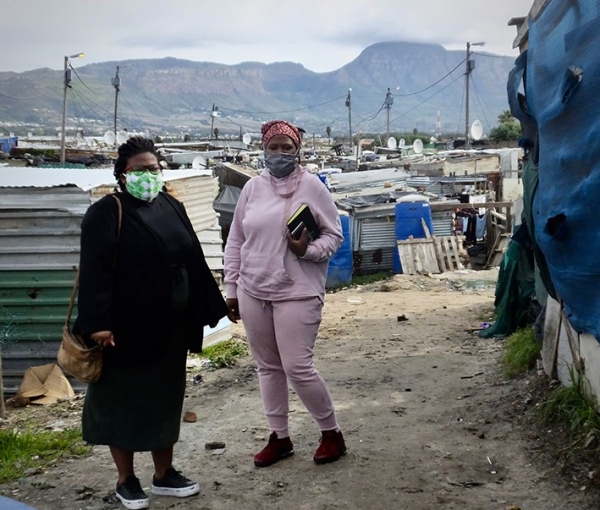
Nolubabalo Bulana, aged 25 (left) and Atashi Tose (29) stand outside a community kitchen in Vrygrond informal settlement. Tose carries a notebook so she can take notes as Bulana gives the HSRC a brief tour of the kitchen. Vrygrond United 4 Change is a primarily youth-driven movement.
Photo: Andrea Teagle
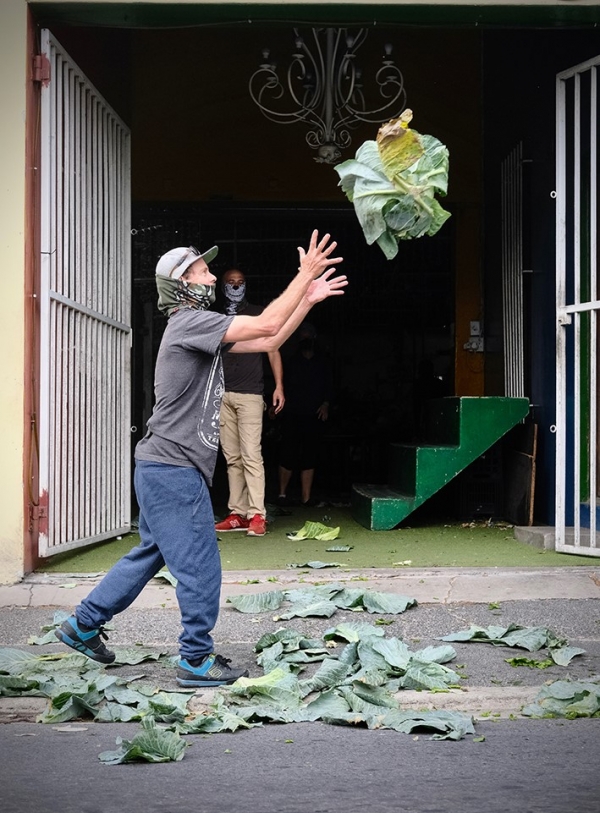
Muizenberg CAN volunteer Lyndon Read, a surfboard shaper by profession, catches a cabbage outside the Muizenberg community kitchen as he and other volunteers unload a delivery of fresh vegetables from The Big Food Drive. The kitchen operates six days a week (Mon-Sat), providing nutritious lunches to roughly 200 people per day. It also acts as a hub to receive, sort and distribute deliveries for community kitchens in the neighbouring communities of Vrygrond and Costa Da Gama.
Photo: Brendon Bosworth
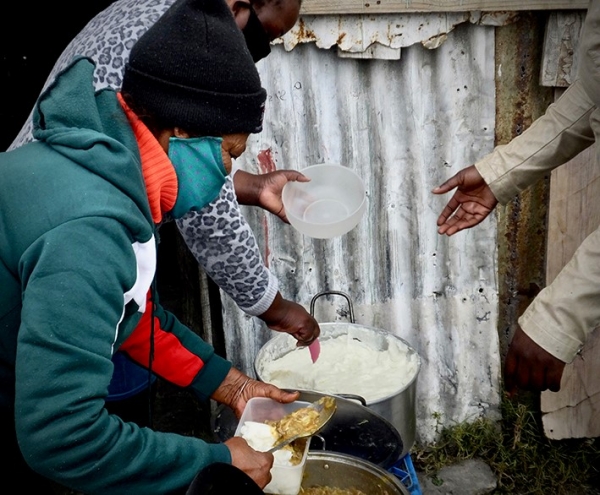
Trader Williams (front) and Magret Chikomo fill plastic containers with warm chicken and pap one wintery Saturday in Vrygrond.
Photo: Andrea Teagle
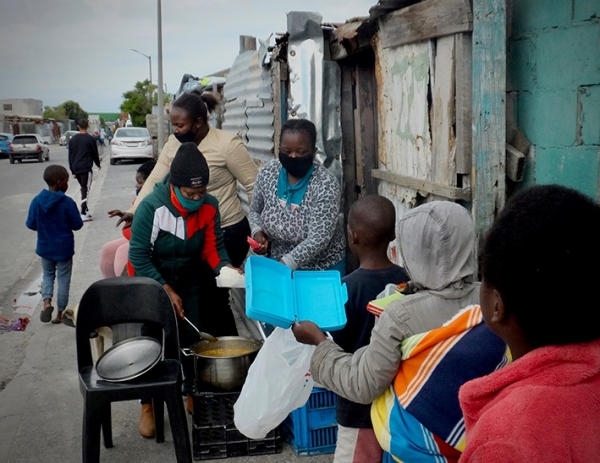
Volunteers at Patience's Community Kitchen, Trader Williams (left), Doreen Kandororo (middle) and Magret Chikomo dish up chicken, pap and spinach to young Vrygrond residents who wait with containers that they will take back to their families. The kitchen is one of two run by foreign nationals to ensure that non-locals in the community are able to access food without fear of xenophobia. Says Vrygrond United 4 Change secretary Nolubabalo Bulana, "In our kitchens, we made it clear, we're promoting Ubuntu, humanism and africanism."
Photo: Andrea Teagle

Vrygrond is one of Cape Town's oldest settlements, and home to South Africans as well as people from other parts of Africa. With high rates of unemployment, crime and food insecurity, limited access to services and no nearby health-care facilities, communities within the wider Vrygrond area were hard hit by lockdown.
Photo: Andrea Teagle

